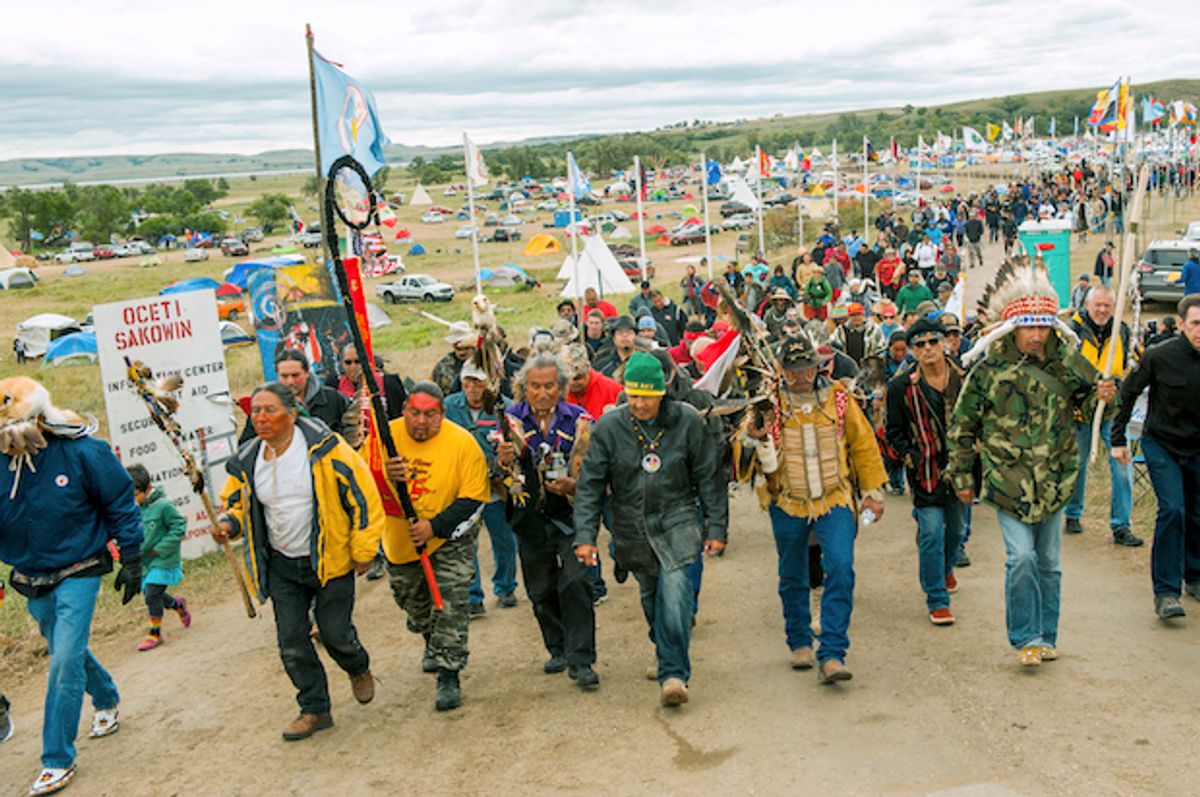Federal authorities unexpectedly announced on Friday that they will delay construction of the Dakota Access oil pipeline in an area that has seen large protests.
This surprise announcement came mere moments after a federal court ruled that construction of the massive North Dakota oil pipeline could continue.
For weeks, environmental and social justice activists from around the country have joined demonstrations against the pipeline, led by indigenous groups that warn it will pollute their land and water.
The Dakota Access pipeline is a $3.7 billion project that will span at least 1,168 miles, from North Dakota to Illinois.
In July, the Standing Rock Sioux tribe filed a lawsuit arguing that when the Army Corps of Engineers authorized the Dallas-based Energy Transfer Partners to build the pipeline, it did not follow proper procedures.
On Friday U.S. District Judge James Boasberg ruled in favor of the pipeline. He said the Army Corps "likely complied" with its obligation to consult the tribe. Boasberg also claimed the tribe had "not shown it will suffer injury that would be prevented by any injunction the court could issue."
Boasberg did concede, however, that "the United States' relationship with the Indian tribes has been contentious and tragic."
Immediately after the judge's decision, the Department of Justice, the Department of the Army and the Department of the Interior responded with a joint statement saying that, while they "appreciate" the court's opinion, the "Army will not authorize constructing the Dakota Access pipeline on Corps land bordering or under Lake Oahe until it can determine whether it will need to reconsider any of its previous decisions regarding the Lake Oahe site under the National Environmental Policy Act (NEPA) or other federal laws."
The federal agencies requested that the company "voluntarily pause all construction activity" within 20 miles of Lake Oahe, a body of water that traverses the border of North and South Dakota.
The agencies added, "Important issues raised by the Standing Rock Sioux Tribe and other tribal nations and their members regarding the Dakota Access pipeline specifically, and pipeline-related decision-making generally, remain."
In a statement, the Standing Rock Sioux tribe said the federal agencies' "stunning move" is "a game changer for the tribe."
"We are acting immediately on our legal options, including filing an appeal and a temporary injunction to force DAPL to stop construction," the tribe wrote, referring to the pipeline by an acronym.
The protests against the oil pipeline have received little coverage in major media networks, despite a clampdown on the peaceful activists. Pipeline security has pepper sprayed protesters and sicced dogs on them.
https://www.youtube.com/watch?time_continue=354&v=kuZcx2zEo4k
As Salon previously reported, arrest warrants were issued on Wednesday for Green Party presidential candidate Jill Stein and her running mate, Ajamu Baraka, for participating in civil disobedience protests at the pipeline.
“I hope they take action against the Dakota Access Pipeline company that is endangering drinking water not only for the Standing Rock Sioux, but for millions of people downstream of the reservation who depend on the Missouri River,” Stein said in a campaign statement, responding to the arrest warrants.
“The pipeline will carry up to 570,000 barrels of highly polluting Bakken crude oil per day. This would be another deadly blow to a climate teetering on the brink. It cannot be allowed to go forward,” she added.
The federal agencies emphasized in their statement that they "fully support the rights of all Americans to assemble and speak freely." But they also warned, "Anyone who commits violent or destructive acts may face criminal sanctions from federal, tribal, state or local authorities."
Amnesty International, which sent human rights observers to the demonstrations, released a statement stressing that U.S. authorities must protect people's right to protest.
“Authorities have a duty to protect the rights of Indigenous peoples, including their right to peacefully protest,” said Tarah Demant, a senior director with Amnesty International USA.
“It is the responsibility of the police to ensure the right to peaceful protest and freedom of expression,” Demant emphasized.
The Army, DOJ and Department of the Interior also noted in their joint statement that "this case has highlighted the need for a serious discussion on whether there should be nationwide reform with respect to considering tribes’ views on these types of infrastructure projects." The agencies said they will have consultations with the tribes.

Shares